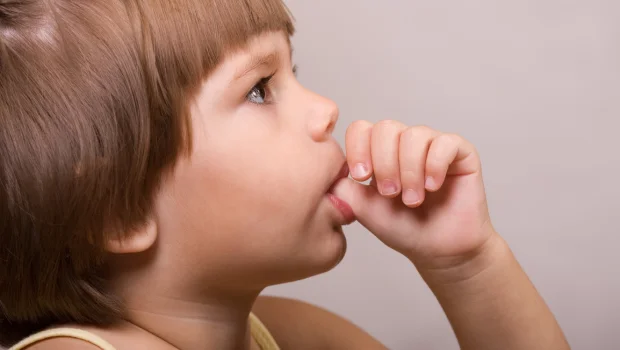
Kick the Thumb Sucking Habit: Powerful Solutions for Your Child

Thumb sucking habit is a concern many parents have. Toddlers suck their thumbs because it’s comforting and calming. It’s probably something they did before they were born and revert back to it when they are nervous, agitated, scared, or ill. They may also use it to lull themselves back to sleep in the middle of the night.
Table of Contents
Parents shouldn’t concern themselves unless it continues after the age their permanent teeth begin to appear, around six years old. Experts say that it’s the intensity of the thumb sucking and the tongue’s thrust that deforms teeth and makes braces necessary later. Children who rest their thumb passively in their mouth are less likely to have difficulty than children who suck aggressively. If you’re concerned, closely monitor your child and analyze his technique. If they appear to be sucking vigorously, you may want to begin curbing their thumb sucking habit earlier.

Punishing or nagging your child to stop won’t help because it’s usually an automatic response. Attempting to curb it by putting an elastic bandage on his thumb or another method will seem like unjust punishment, especially since they indulge in the habit for comfort and security.
Try to wait it out. Children usually give up thumb sucking habit when they’ve found other ways to calm and comfort themselves. Consider offering them other alternatives to comfort themselves such as a soft blanket or lullaby toy
The key is to notice when and where they are likely to suck their thumbs and offer an alternative. If it happens while they are tired, try giving more naps. If they suck their thumb frequently while watching television, try to distract them with a toy that will keep their hands occupied.

Older children may need gentle reminders to curtail thumb sucking while in public, and praise should be given freely when the child finds and uses an acceptable alternative. Your child’s pediatric dentist can offer other suggestions for helping your child kick the thumb sucking habit.
When to Worry: Dental Concerns
For parents, the concern typically arises when thumb sucking persists beyond the age when permanent teeth start to appear, usually around six years old. Experts caution that it’s not the act itself but the intensity of thumb sucking and the thrust of the tongue that can lead to dental deformities, potentially necessitating braces later on. Children who passively rest their thumb in their mouth are less likely to encounter dental issues than those who suck more vigorously. If you’re worried, closely observe your child’s technique, and if it appears intense, you might consider intervening earlier to curb the habit.
Effective Strategies: Breaking the Thumb Sucking Habit
Punishing or nagging your child to stop thumb sucking is generally ineffective, as it often serves as an automatic response. Implementing methods such as putting an elastic bandage on their thumb may seem like unjust punishment, especially considering that thumb sucking provides comfort and security. Instead of resorting to punitive measures, try to be patient. Children often give up thumb sucking when they discover alternative ways to calm and comfort themselves.
For instance, introducing your child to a nurturing environment such as a nursery can significantly contribute to breaking the thumb-sucking habit. The benefits of sending your child to nursery, extend beyond addressing specific habits and often provide a structured setting that encourages socialization and engagement, offering a variety of activities that can divert a child’s attention from thumb sucking to more constructive behaviors.
Seeking Professional Guidance
If you find it challenging to guide your child away from thumb sucking habit , consult with your child’s pediatric dentist for additional suggestions and support. Pediatric dentists often have valuable insights into addressing oral habits and can provide tailored advice based on your child’s specific needs.
Conclusion: Supporting Your Child’s Development
In conclusion, helping your child overcome the thumb sucking habit involves patience, understanding, and the introduction of suitable alternatives. By being attentive to your child’s habits and providing positive reinforcement, you can support them in making the transition to healthier self-soothing mechanisms. If needed, seek guidance from healthcare professionals, such as pediatric dentists, to ensure your child’s dental health is maintained while they navigate this developmental phase.
Follow us on social media



